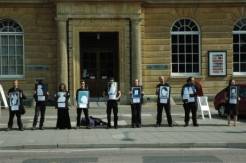Westside Action
a motley crew of anarchists and activists from Bristol, Bath and South WalesArchive for copenhagen
Letter From COP15 Accused, 19th March
Dear All,
First of all, Noah and I wanted to say a massive thank you for all the solidarity, the actions, articles, petitions and messages of care that have been organized in solidarity with our trial. Although we know that political repression of this sort targets all activists, it does feel very isolating being the people picked out and charged. Every single action of solidarity has made this process easier for us and reminded us that we are not alone. So thank you!
We have had several victories, some beautiful court moments, and a very stressful week in court. Our case was extended for three more days- which will not happen until August. Noah and I are both sad that the trial is not over but relieved to have not been judged yesterday. I have included english versions of some of the danish press coverage on the case below to give you a better idea of what has been going on in our trial.
We were originally given two days in court for our trial (the tuesday and friday just passed). We had been charged with organizing violence against the police, gross public disorder, systematic destruction of property and gross disturbance of public infrastructure. Two of these are charges associated with danish terror laws. The police said that we did this from the period of october to december 2009 but that these things were mostly to be carried out in copenhagen during the period of the 11th to the 18th of December. They said that the alleged actions we are accused of mostly failed because the police managed to stop them- in part by arresting Noah on the 11th and me on the 13th of December and keeping us in prison for the rest of the COP (and three more weeks- just to be sure!).
On the morning of the first day in court our lawyers argued for the case to be dropped. They explained that charges in Denmark usually have to include some description of what people are accused of doing, including things like how they were doing it, where, when…anything really. They successfully removed one of the terror charges (gross disturbance of public infrastructure) and got the police prosecutor to admit that none of the things we were accused of had any relation to what happened on the streets in Copenhagen during the COP 15. So now we are just accused of attempting actions, not actually carrying anything out!
It was at this point that the police prosecutor introduced the crystal ball defense. No more details than “something bad was supposed to happen at some point somewhere in Copenhagen” could be supplied by the police because they couldn’t look into their crystal ball when they charged us! In a spectacular display of confidence in the charges she then asked the court to note that she had not actually written them herself!
The court decided to continue with the rest of the charges regardless, but after two days in court I am wondering if they regret that decision. The ‘evidence’ for the non-specific things we are accused of organizing is spurious at best and in the worst cases produced bursts of laughter from both judges and spectators in court. They have trucked out tiny bits of conversations from tapped phones between other people and asked us to interpret them, radically reinterpreted what we and others have said on the phone (from over three months of our private conversations that they recorded) to the point where even the judge objected. They used notes from brainstorms, scribbled notes from media report backs, and outlandish conjecture to try to demonize us.
My personal favorite is a note i made about big bolt cutters. Instead of asking to interview her during her three weeks in prison (although they said one of the reasons i was kept was for further investigation), they chose to leave until court to ask what was meant by this note in my confiscated personal note book. I explained that it was prop for a demonstration that was a huge two meter tall paper mache bolt cutter. It was to be used on the day of the climate no-borders day of action as both a humorous and serious way to say it is illegitimate to cage human beings. The prosecutor tried to throw doubt on the honesty of my reply until two of the audience in court went to pick them up from a local social center and brought them in for the court to see. Everyone but the prosecutor laughed.
The state of the evidence would really be hilarious if the case didn’t carry such serious consequences both for us personally and for Democracy in Denmark. We are the first of a series of cases against people accused of organizing. It seems that the Danish state is using us as a test case for new anti-activist laws they have passed, the extension of terror legislation to cover any form of political protest and to establish the ability to try people for things that never actually occurred.
Noah and I were both picked up and arrested on the side of the road while riding our bikes by ourselves, threatened, isolated and kept in prison for over three weeks of ‘preventative detention’. The personal impacts of this have been huge. Even scarier though is the potential effect this has on everyone’s ability to speak up about things they care about in Denmark. If they manage to criminalize protest to the extent that going to meetings, organizing speakers for a demonstration, or being a media spokes person can land you in jail, then what sort of world will we be living in? If they manage to say intense surveillance and monitoring of activists and their lovers and friends is legitimate, and arrests should be made on crystal ball suspicions of potential actions- then we have moved from even the sham of liberal democracy to a society more reminiscent of 1984 than any of us would like to admit.
It is clear also that this is not just happening in Denmark. Since our arrests we have heard of countless political prisoners facing the hard end of political repression. After our experience of injustice and repression in Denmark we feel very personally that it is so important that all of us speak out and not let this repression continue.
Free all political prisoners, drop the charges for the Cop 15 defendants and all people arrested during the COP15, and end political repression NOW!!!
Love, solidarity and actions for a better world
tash and noah xo
Danish police raid Copenhagen climate campaigners’ rooms
Danish police raid Copenhagen climate campaigners’ rooms
Police detain 200 activists at their Copenhagen accommodation and seize items they claim could be used for acts of civil disobedience
(Guardian Article)
 Copenhagen police seized items including paint bombs and shields which they claimed could be used for acts of civil disobedience. Photograph: Dresling Jens/AP
Copenhagen police seized items including paint bombs and shields which they claimed could be used for acts of civil disobedience. Photograph: Dresling Jens/AP
Danish police last night raided a climate campaigners’ accommodation centre in Copenhagen, detaining 200 activists and seizing items including paint bombs and shields which they claimed could be used for acts of civil disobedience.
About 200 police arrived at the shelter on Ragnhild Street, in the Nørrebro district of Copenhagen, at 2.30am. They locked activists into the building for two hours, and searched some of the nearby properties. Campaigners say they took away various items including a power drill, an angle grinder, and some wooden props. No arrests were made.
Police confirmed the raid took place and issued a statement saying among the items they had found were “58 fluorescent tubes containing a mixture of paint and oil, closed in both ends with candle wax, 193 riot shields, nine metal cages measuring 4x2m, which are capable of rolling and constructed inside with milk cartons, which could be used for staircases.”
A spokeswoman for Climate Justice Action (CJA), one of the activist groups, said: “People were enormously frightened and alarmed. We really don’t know why the police handled it like this: the Danish government has provided this accommodation for activists and now the police are acting unnecessarily. We’ll be asking for the items they confiscated back.”
The centre on Ragnhild Street is one of a handful of sleeping spaces provided by the government for the protesters who are expected during the course of the summit. Activists estimate that between 30,000-40,000 protesters may arrive over the next couple of weeks. Hundreds of small-scale actions are planned, and three large-scale peaceful protests are also due to take place on Saturday, Sunday, and Wednesday.
Police have said that although they will facilitate peaceful protest, they fear that an international extremist network may come to Copenhagen to join the peaceful protests then break away to commit acts of violence.
The head of the Police Intelligence Service (PET), Jakob Scharf, has said that “violent extremists will try to abuse and get a free ride on the peaceful activist involvement in the climate debate.”
Scharf said he feared that peaceful protesters may end up in a battle zone between extremists and police.
Some activists have privately conceded that there may well be trouble at some of the upcoming demonstrations. But most strongly refute the idea that troublemakers are descending on Copenhagen. “We’ve found that to be a myth put about by people who are seeking to undermine the genuine reasons people are protesting,” said Mel Evans of CJA. “We’ve issued a call out for people to take peaceful action on climate change and that’s why they’re coming here.”
Copenhagen Day 3
Protests Inside Bella Centre: Some African Delegates Threaten to Walk Out/Border Crossing Point Info for Activists
Lumumba Di-Aping of Sudan, the head of the 135-nation bloc of developing countries, said the $10 billion a year that has been proposed to help poor nations fight climate change paled in comparison to the more than $1 trillion already spent to rescue financial institutions.
“If this is the greatest risk that humanity faces, then how do you explain $10 billion?” he said. “Ten billion will not buy developing countries’ citizens enough coffins.”
Stuck at The Border? Important Numbers to Note before you Leave
While it seems that police is strengthening border control, we have updated the relevant section in the practical info on the website.
Constant updates about borders can be found here borderwatchcop15.blogsport.de
Flensburg (German/Danish border): Phone 0049 (0)15153610132.
Rostock (German/Danish border): Phone 0049 (0)15224551075
grenzsolicop15-rostock@riseup.net
download public key
Malmoe (Swedish/Danish border): 0046 760188650
Read more about border control here http://www.climate-justice-action.org/practical-info/copenhagen-info/#Border%20control
Climate Rage!
Climate Rage
One last chance to save the world—for months, that’s how the United Nations summit on climate change in Copenhagen, which starts in early December, was being hyped. Officials from 192 countries were finally going to make a deal to keep global temperatures below catastrophic levels. The summit called for “that old comic-book sensibility of uniting in the face of a common danger threatening the Earth,” said Todd Stern, President Obama’s chief envoy on climate issues. “It’s not a meteor or a space invader, but the damage to our planet, to our community, to our children and their children will be just as great.”
That was back in March. Since then, the endless battle over health care reform has robbed much of the president’s momentum on climate change. With Copenhagen now likely to begin before Congress has passed even a weak-ass climate bill co-authored by the coal lobby, U.S. politicians have dropped the superhero metaphors and are scrambling to lower expectations for achieving a serious deal at the climate summit. It’s just one meeting, says U.S. Energy Secretary Steven Chu, not “the be-all and end-all.”
As faith in government action dwindles, however, climate activists are treating Copenhagen as an opportunity of a different kind. On track to be the largest environmental gathering in history, the summit represents a chance to seize the political terrain back from business-friendly half-measures, such as carbon offsets and emissions trading, and introduce some effective, common-sense proposals— ideas that have less to do with creating complex new markets for pollution and more to do with keeping coal and oil in the ground.
Among the smartest and most promising—not to mention controversial—proposals is “climate debt,” the idea that rich countries should pay reparations to poor countries for the climate crisis. In the world of climate-change activism, this marks a dramatic shift in both tone and content. American environmentalism tends to treat global warming as a force that transcends difference: We all share this fragile blue planet, so we all need to work together to save it. But the coalition of Latin American and African governments making the case for climate debt actually stresses difference, zeroing in on the cruel contrast between those who caused the climate crisis (the developed world) and those who are suffering its worst effects (the developing world). Justin Lin, chief economist at the World Bank, puts the equation bluntly: “About 75 to 80 percent” of the damages caused by global warming “will be suffered by developing countries, although they only contribute about one-third of greenhouse gases.”
Climate debt is about who will pick up the bill. The grass-roots movement behind the proposal argues that all the costs associated with adapting to a more hostile ecology—everything from building stronger sea walls to switching to cleaner, more expensive technologies—are the responsibility of the countries that created the crisis. “What we need is not something we should be begging for but something that is owed to us, because we are dealing with a crisis not of our making,” says Lidy Nacpil, one of the coordinators of Jubilee South, an international organization that has staged demonstrations to promote climate reparations. “Climate debt is not a matter of charity.”
Sharon Looremeta, an advocate for Maasai tribespeople in Kenya who have lost at least 5 million cattle to drought in recent years, puts it in even sharper terms. “The Maasai community does not drive 4x4s or fly off on holidays in airplanes,” she says. “We have not caused climate change, yet we are the ones suffering. This is an injustice and should be stopped right now.”
The case for climate debt begins like most discussions of climate change: with the science. Before the Industrial Revolution, the density of carbon dioxide in the atmosphere—the key cause of global warming—was about 280 parts per million. Today, it has reached 387 ppm—far above safe limits—and it’s still rising. Developed countries, which represent less than 20 percent of the world’s population, have emitted almost 75 percent of all greenhouse-gas pollution that is now destabilizing the climate. (The U.S. alone, which comprises barely five percent of the global population, contributes 25 percent of all carbon emissions.) And while developing countries like China and India have also begun to spew large amounts of carbon dioxide, the reasoning goes, they are not equally responsible for the cost of the cleanup, because they have contributed only a small fraction of the 200 years of cumulative pollution that has caused the crisis.
In Latin America, left-wing economists have long argued that Western powers owe a vaguely defined “ecological debt” to the continent for centuries of colonial land-grabs and resource extraction. But the emerging argument for climate debt is far more concrete, thanks to a relatively new body of research putting precise figures on who emitted what and when. “What is exciting,” says Antonio Hill, senior climate adviser at Oxfam, “is you can really put numbers on it. We can measure it in tons of CO2 and come up with a cost.”
Equally important, the idea is supported by the United Nations Framework Convention on Climate Change—ratified by 192 countries, including the United States. The framework not only asserts that “the largest share of historical and current global emissions of greenhouse gases has originated in developed countries,” it clearly states that actions taken to fix the problem should be made “on the basis of equity and in accordance with their common but differentiated responsibilities.”
The reparations movement has brought together a diverse coalition of big international organizations, from Friends of the Earth to the World Council of Churches, that have joined up with climate scientists and political economists, many of them linked to the influential Third World Network, which has been leading the call. Until recently, however, there was no government pushing for climate debt to be included in the Copenhagen agreement. That changed in June, when Angelica Navarro, the chief climate negotiator for Bolivia, took the podium at a U.N. climate negotiation in Bonn, Germany. Only 36 and dressed casually in a black sweater, Navarro looked more like the hippies outside than the bureaucrats and civil servants inside the session. Mixing the latest emissions science with accounts of how melting glaciers were threatening the water supply in two major Bolivian cities, Navarro made the case for why developing countries are owed massive compensation for the climate crisis.
“Millions of people—in small islands, least-developed countries, landlocked countries as well as vulnerable communities in Brazil, India and China, and all around the world—are suffering from the effects of a problem to which they did not contribute,” Navarro told the packed room. In addition to facing an increasingly hostile climate, she added, countries like Bolivia cannot fuel economic growth with cheap and dirty energy, as the rich countries did, since that would only add to the climate crisis—yet they cannot afford the heavy upfront costs of switching to renewable energies like wind and solar.
The solution, Navarro argued, is three-fold. Rich countries need to pay the costs associated with adapting to a changing climate, make deep cuts to their own emission levels “to make atmospheric space available” for the developing world, and pay Third World countries to leapfrog over fossil fuels and go straight to cleaner alternatives. “We cannot and will not give up our rightful claim to a fair share of atmospheric space on the promise that, at some future stage, technology will be provided to us,” she said.
The speech galvanized activists across the world. In recent months, the governments of Sri Lanka, Venezuela, Paraguay and Malaysia have endorsed the concept of climate debt. More than 240 environmental and development organizations have signed a statement calling for wealthy nations to pay their climate debt, and 49 of the world’s least-developed countries will take the demand to Copenhagen as a negotiating bloc.
“If we are to curb emissions in the next decade, we need a massive mobilization larger than any in history,” Navarro declared at the end of her talk. “We need a Marshall Plan for the Earth. This plan must mobilize financing and technology transfer on scales never seen before. It must get technology onto the ground in every country to ensure we reduce emissions while raising people’s quality of life. We have only a decade.”
A very expensive decade. The World Bank puts the cost that developing countries face from climate change—everything from crops destroyed by drought and floods to malaria spread by mosquito-infested waters—as high as $100 billion a year. And shifting to renewable energy, according to a team of United Nations researchers, will raise the cost far more: to as much as $600 billion a year over the next decade.
Unlike the recent bank bailouts, however, which simply transferred public wealth to the world’s richest financial institutions, the money spent on climate debt would fuel a global environmental transformation essential to saving the entire planet. The most exciting example of what could be accomplished is the ongoing effort to protect Ecuador’s Yasuní National Park. This extraordinary swath of Amazonian rainforest, which is home to several indigenous tribes and a surreal number of rare and exotic animals, contains nearly as many species of trees in 2.5 acres as exist in all of North America. The catch is that underneath that riot of life sits an estimated 850 million barrels of crude oil, worth about $7 billion. Burning that oil—and logging the rainforest to get it— would add another 547 million tons of carbon dioxide to the atmosphere.
Two years ago, Ecuador’s center-left president, Rafael Correa, said something very rare for the leader of an oil-exporting nation: He wanted to leave the oil in the ground. But, he argued, wealthy countries should pay Ecuador—where half the population lives in poverty—not to release that carbon into the atmosphere, as “compensation for the damages caused by the out-of-proportion amount of historical and current emissions of greenhouse gases.” He didn’t ask for the entire amount; just half. And he committed to spending much of the money to move Ecuador to alternative energy sources like solar and geothermal.
Largely because of the beauty of the Yasuní, the plan has generated widespread international support. Germany has already offered $70 million a year for 13 years, and several other European governments have expressed interest in participating. If Yasuní is saved, it will demonstrate that climate debt isn’t just a disguised ploy for more aid—it’s a far more credible solution to the climate crisis than the ones we have now. “This initiative needs to succeed,” says Atossa Soltani, executive director of Amazon Watch. “I think we can set a model for other countries.”
Activists point to a huge range of other green initiatives that would become possible if wealthy countries paid their climate debts. In India, mini power plants that run on biomass and solar power could bring low-carbon electricity to many of the 400 million Indians currently living without a light bulb. In cities from Cairo to Manila, financial support could be given to the armies of impoverished “trash pickers” who save as much as 80 percent of municipal waste in some areas from winding up in garbage dumps and trash incinerators that release planet-warming pollution. And on a much larger scale, coal-fired power plants across the developing world could be converted into more efficient facilities using existing technology, cutting their emissions by more than a third.
But to ensure that climate reparations are real, advocates insist, they must be independent of the current system of international aid. Climate money cannot simply be diverted from existing aid programs, such as primary education or HIV prevention. What’s more, the funds must be provided as grants, not loans, since the last thing developing countries need is more debt. Furthermore, the money should not be administered by the usual suspects like the World Bank and USAID, which too often push pet projects based on Western agendas, but must be controlled by the United Nations climate convention, where developing countries would have a direct say in how the money is spent.
Without such guarantees, reparations will be meaningless—and without reparations, the climate talks in Copenhagen will likely collapse. As it stands, the U.S. and other Western nations are engaged in a lose-lose game of chicken with developing nations like India and China: We refuse to lower our emissions unless they cut theirs and submit to international monitoring, and they refuse to budge unless wealthy nations cut first and cough up serious funding to help them adapt to climate change and switch to clean energy. “No money, no deal,” is how one of South Africa’s top environmental officials put it. “If need be,” says Ethiopian Prime Minister Meles Zenawi, speaking on behalf of the African Union, “we are prepared to walk out.”
In the past, President Obama has recognized the principle on which climate debt rests. “Yes, the developed nations that caused much of the damage to our climate over the last century still have a responsibility to lead,” he acknowledged in his September speech at the United Nations. “We have a responsibility to provide the financial and technical assistance needed to help these [developing] nations adapt to the impacts of climate change and pursue low-carbon development.”
Yet as Copenhagen draws near, the U.S. negotiating position appears to be to pretend that 200 years of over-emissions never happened. Todd Stern, the chief U.S. climate negotiator, has scoffed at a Chinese and African proposal that developed countries pay as much as $400 billion a year in climate financing as “wildly unrealistic” and “untethered to reality.” Yet he put no alternative number on the table—unlike the European Union, which has offered to kick in up to $22 billion. U.S. negotiators have even suggested that countries could fund climate debt by holding periodic “pledge parties,” making it clear that they see covering the costs of climate change as a matter of whimsy, not duty.
But shunning the high price of climate change carries a cost of its own. U.S. military and intelligence agencies now consider global warming a leading threat to national security. As sea levels rise and droughts spread, competition for food and water will only increase in many of the world’s poorest nations. These regions will become “breeding grounds for instability, for insurgencies, for warlords,” according to a 2007 study for the Center for Naval Analyses led by Gen. Anthony Zinni, the former Centcom commander. To keep out millions of climate refugees fleeing hunger and conflict, a report commissioned by the Pentagon in 2003 predicted that the U.S. and other rich nations would likely decide to “build defensive fortresses around their countries.”
Setting aside the morality of building high-tech fortresses to protect ourselves from a crisis we inflicted on the world, those enclaves and resource wars won’t come cheap. And unless we pay our climate debt, and quickly, we may well find ourselves living in a world of climate rage. “Privately, we already hear the simmering resentment of diplomats whose countries bear the costs of our emissions,” Sen. John Kerry observed recently. “I can tell you from my own experience: It is real, and it is prevalent. It’s not hard to see how this could crystallize into a virulent, dangerous, public anti-Americanism. That’s a threat too. Remember: The very places least responsible for climate change—and least equipped to deal with its impacts—will be among the very worst affected.”
That, in a nutshell, is the argument for climate debt. The developing world has always had plenty of reasons to be pissed off with their northern neighbors, with our tendency to overthrow their governments, invade their countries and pillage their natural resources. But never before has there been an issue so politically inflammatory as the refusal of people living in the rich world to make even small sacrifices to avert a potential climate catastrophe. In Bangladesh, the Maldives, Bolivia, the Arctic, our climate pollution is directly responsible for destroying entire ways of life—yet we keep doing it.
From outside our borders, the climate crisis doesn’t look anything like the meteors or space invaders that Todd Stern imagined hurtling toward Earth. It looks, instead, like a long and silent war waged by the rich against the poor. And for that, regardless of what happens in Copenhagen, the poor will continue to demand their rightful reparations. “This is about the rich world taking responsibility for the damage done,” says Ilana Solomon, policy analyst for ActionAid USA, one of the groups recently converted to the cause. “This money belongs to poor communities affected by climate change. It is their compensation.”
What Does Climate Justice Look Like?:The Case Of BP In Colombia/Cinema Klandestino presents: “Our Oil And Other Tales”
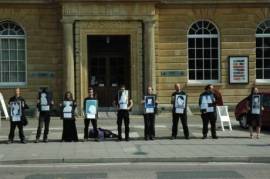
Bristol Rising Tide Protest BP's Sponsorship of The National Portrait Award in 2007
Tuesday 10th November – 8pm
Cinema Klandestino present Our Oil And Other Tales plus
Wednesday 11th November – 6.30-9pm
What Does Climate Justice Look Like? Copenhagen and The Energy Crisis: The Case Of BP In Colombia
At the Old Council Chamber, Department of Law, University of Bristol
Wills Memorial Building, Bristol BS8 1RJ
As world leaders and world activists prepare to descend on Copenhagen to take action on climate change, have we fully understood its structural causes? Colombian NGOs argue that the developed countries need to control their patterns of consumption, luxury and waste. Who is responsible for the global North’s ecological debt to the global South?
Colombian social movements argue that multinational oil and mining corporations, especially BP and other British based companies, have destroyed their environment, their human rights and social fabric. This raises vital questions linking environmental justice with international solidarity. As Colombian communities struggle to defend their territories against multinational plunder, what can be done to build links with those affected by the seemingly unquenchable thirst for profit? How can corporations like BP be made accountable?
Guest speaker Isaac Marín from COSPACC, Colombia introduces and explores the situation on the ground in Casanare. The leader of this grass-roots organisation looks at the social and enviromental effects of BP in the region. Yasmine Brien (Rising Tide) re-contextualises climate change and global energy politics in terms of climate justice, including a look at so called “green” solutions such as biofuels.
Organised by Colombia Solidarity Campaign, Bristol Rising Tide and Espacio Bristol-Colombia. Chaired by Alice Cutler from Trapese. For info on this event contact: o.edwards@gmail.com or suspiciousasians@yahoo.co.uk
07838 504840
Tuesday 10th November – 8pm
Cinema Klandestino present Our Oil And Other Tales

With introduction and discussion afterwards led by Mark Ellingsen (Bristol Solidarity with Venezuela) and Thomas Muhr (University of Bristol)
A two-month journey across Venezuela, from Lake Maracaibo to the Orinoco Delta. The people of the oil fields and the mining centres talk of their close encounter with these exploitations. For the first time, in the revolutionary Venezuela, a documentary delves deep in the problematic of oil and coal, from the angle of the life experience of communities, oil workers, indigenous people.
The film takes a look at world politics on oil and other extractive activities, jointly with the themes of sovereignty and self-determination of a people engaged in a real process of change.
Directed by: Elisabetta Andreoli, Gabriele Muzio, Sara Muzio y Max Pugh
Produced by: Gattacicova (Italy) and Yeast Films (UK)
From the film makers of “another way is possible in Venezuela”
83 minutes, Spanish with subtitles in English
Call 07747 833376 and listen to the brief message for venue and directions.
Putting “The Fun Between Your Legs” in Copenhagen
The Laboratory of Insurrectionary Imagination and Climate Camp are plotting together to design and build a new tool of civil disobedience for the RECLAIM POWER mobilisations taking place in Copenhagen, during the UN climate summit in December. Made from hundreds of recycled bikes, The Bike Bloc will merge device of mass transportation and pedal powered resistance machine, postcapitalist bike gang and art bike carnival.
Everything we take for granted: the weekend, gay rights, contraception, women wearing trousers, the right to strike, to form a union, the abolition of slavery. Everything was won by disobedience, fought for by people who refused and resisted, claimed back from those in power. Their disobedience was a gift to our future.
Every form of rebellion we know, from protest marches to lock-ons, barricades to boycotts, factory occupations to street parties, super glue actions to climate camps was invented, dreamt up and designed. More often than not, by a small group of people huddled together, laughing and creatively conspiring with each other; engineering the art of resistance.
The Laboratory of Insurrectionary Imagination and Climate Camp are plotting together to design and build a new tool of civil disobedience for the RECLAIM POWER mobilisations taking place in Copenhagen, during the UN climate summit in December. Made from hundreds of recycled bikes, The Bike Bloc will merge device of mass transportation and pedal powered resistance machine, postcapitalist bike gang and art bike carnival.
Bike hackers, welders, climate campers, artists and engineers will be working together to design and build The Bike Bloc across two cities: Bristol (Arnolfini Gallery 15th 30th Nov.) and Copenhagen (4th- 18th Dec.) Come and take part, either designing and building the prototype in Bristol, putting together the real thing in Copenhagen or swarming with us on the day of civil disobedience on the 16th of December.
*Put the fun between your legs, become the bike bloc.*
For times and how to get involved:
funbetweenyourlegs.info
bikebloc@climatecamp.org.uk
Turning the Heat Up before Copenhagen !
…Or should that be down?

Climate Justice Activists Scale Didcot Power Station
Climate campaigners have this morning shut down N-Power’s flagship coal plant at Didcot in Oxforshire, and Shipley Open Cast Coal Mine in Derbyshire was shut down for several hours this morning.
The twenty peaceful protesters rode their push-bikes past security guards at 4.30am this morning before splitting into two groups. One team has shut down the giant coal conveyors which feed the boilers at the plant, while a second group of nine men and women has climbed the inside of the iconic 200m-high chimney and reached the top. They say they have enough food and water to stay in place for ‘weeks, not days’ – during which time the plant will be unable to operate. Already the activists in the chimney are securing the route behind them to ensure they can’t be reached by police and security guards.
Meanwhile…
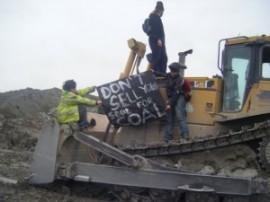
Today 20 activists from Earth First! (1) stopped work at UK Coal’s opencast coal mine near Shipley (2), Derbyshire. The protesters entered the site at 9.20am and climbed on top of machinery, intending to stay as long as possible they are currently occupying 6 vehicles. This protest is part of a campaign to stop new coal mines and coal power stations in the UK. It follows hot on the heels of last week’s Climate Swoop at Ratcliffe-on-Soar power station, where coal from Shipley is burnt.
Shipley is one of over 30 new coal mines recently given the go ahead as part of the government’s drive to expand opencast coal mining in the UK. This is to secure coal supply for the 6 proposed new coal power stations. The mine at Shipley alone will provide 1 million tonnes of coal over the next four years, equivalent to the release of 3.5 million tonnes of CO2 into the atmosphere.
Liz Cartmel, a protester at the site said “We recognise the important role coal mining has played in the local economy in the past, but at a time where our future survival hangs in the balance we need to work towards a future without climate destroying coal. Our only way out of the climate crisis is to reduce consumption and to use renewable energies such as wind and solar.”
Green Scare in the UK (part II): UPDATED
As the Climate Justice Movement becomes bigger and more of a threat, repression grows:

UPDATED SUNDAY:NOW WORKER ACTION TARGETTED UNDER TERRORIST LEGISLATION “The main contractor at Fiddler’s Ferry power station in Cheshire is seeking an injunction under the Prevention of Terrorism Act to prevent blacklisted workers from picketing the site. A hearing is pending in the Royal Courts of Justice, London, on Wednesday 21st October at 10.30am, at which a company is applying for an injunction against Steve Acheson, one of the 3 electricians in the class legal action blacklist case against companies affiliated to Ian Kerr’s Consulting Association, & also Sec. of the Unite/EPIU Manchester Contracting Branch: this is an injunction sought by the company (main contractor) at Fiddlers Ferry. This injunction is being brought under the Prevention of Terrorism Act & seeks to show that Steve, as the 1st respondent, & others unnamed [as second respondents], by their constant picketing of the site represent “a threat to the energy supplies of this country”. Because this application is being brought under the Prevention of Terrorism Act, Steve will not be able to defend himself at this hearing, as we understand it. The basis of the application is that by picketing the site he is committing a Trespass because he & others are on the Firm’s property; that having issued leaflets to workers on the site calling for ‘direct action’ he is ‘inciting’ the workforce to commit acts contrary to the national interest which may impact on energy supplies & that he has, at times, acted in a way that might have intimidated the workforce. There is no mention in the company’s deposition to the Court that he was formerly employed by them, nor that his picket represents a campaign against blacklisting. One senior trade union leader in the RMT has already said that if this goes ahead it will have consequences for the whole trade union movement.”
CLIMATE TERRORISTS?
Too tired to write seperate article but one additional quote from the coppers who interviewed us: “95% of people we stop under this legislation aren’t terrorists”. This shouldn’t make people afraid of travellling to Copenhagen – or any other international mobilisation – but any travel plans should take this into consideration.
The Next Bristol- Copenhagen Mobilisation meeting is: Monday 26th October, Kebele, 14 Robertson rd, Bristol. BS5 6JY at 7pm
UK border police (Kent Constabulary) used anti-terrorist legislation to prevent 4 British climate change activists (including a westsider) from crossing over into mainland Europe where he planned to take part in events surrounding the forthcoming United Nations summit in Denmark.
Chris Kitchen, a 31-year-old office worker, said he feared his treatment by police could mark the start of a clampdown on protesters, hundreds of whom are planning to travel to Copenhagen for the climate change talks in December.
Tonight he will make a second attempt to reach Denmark, where he plans to take part in discussions organised by a network of protest groups coming together under the banner Climate Justice Action.
He said he was prevented from crossing the border yesterday at about 5pm, when the coach he was travelling on stopped at the Folkestone terminal of the Channel tunnel.
Jack Sheppard adds:
“On our second try to get to Copenhagen we we’re reminded that we were relatively lucky, when 2 “Sans Papiers” were removed from our coach at 3.00am – probably to a German Detention Centre”
Kitchen said police officers boarded the coach and, after checking all passengers’ passports, took him and another climate activist to be interviewed under schedule 7 of the Terrorism Act 2000, a clause which enables border officials to stop and search individuals to determine if they are connected to terrorism.
The passports were not initially scanned, Kitchen said, suggesting the officials knew his name and had planned to remove him from the coach before they boarded. During his interview, he was asked questions about his family, work and past political activity. The police also asked him what he intended to do in Copenhagen.
When Kitchen said that anti-terrorist legislation does not apply to environmental activists, he said the officer replied that terrorism “could mean a lot of things”. By the time his 30-minute interview had concluded, Kitchen’s coach had gone.
Police are understood to be monitoring protesters on a number of databases, some of which highlight individuals when they pass through secure areas, such as ports.
Kitchen is a prominent activist who has taken place in a number of peaceful acts of civil disobedience, such as glueing himself to a statue in parliament, to call for more action to cut carbon emissions.
“The use of anti-terrorist legislation like this is another example of political policing, of the government harassing and intimidating people practising their hard earned democratic rights,” he said. “We are going to Copenhagen to take part in Climate Justice Action because we want to protest against false solutions like carbon trading and to build a global movement for effective, socially just solutions.
“People who are practising civil disobedience on climate change in the face of ineffectual government action are certainly not terrorists, and I am sure that their actions will be vindicated by history.”
Kitchen said police paid for a ticket for him to return to London after questioning and arranged for the coach company to give him a seat on another coach.
A Home Office spokesman said: “There has been no change in policy. Schedule 7 of the Terrorism Act 2000 enables an examining officer to stop, search and examine a person at a port or in a border area to determine whether they are someone who is or has been concerned in the commission, preparation or instigation of acts of terrorism.
“The exercise of the powers by the police is an operational matter for each force.”
Jack Sheppard adds: “The fact that legislation allows people to be detained, delayed -and forced to answer questions (under the legislation “no comment” is an offence), have there mobile phones confiscated and presumably empited of all there numbers, texts etc without even reasonable grounds for suspicion that we were going commit terrorist offences – the interviewing police officers made it clear that we weren’t suspected of being terrorists,or or were ever likely to commit them in the future is clearly a piss take.”
Swoop Arrests:
Climate activists including members of campaigning groups Climate Camp and Plane Stupid have pledged to shut down the Ratcliffe-on-Soar coal power station run by German energy giant E.ON. The arrests follow an injunction taken out by E.ON against protesters that will allow police to arrest anyone who enters the plant’s grounds. A large police and private security presence is expected at the site, which has upped its security measures, including the erection of a new electric fence.
The campaigner charged yesterday has been released and bailed to return to a police station on Saturday, when the power station protests are due to take place. On Tuesday this week, 31-year-old office worker Chris Kitchen was prevented from travelling to Copenhagen to take part in events around the UN climate talks this December. Three other activists are now understood to have been detained and searched this week while attempting to travel to Copenhagen, though they have subsequently completed their journeys.
Activists for Plane Stupid also claimed they were phoned yesterday by Nottinghamshire police and told “they would be arrested” if they came to Ratcliffe-on-Soar. Tracy Singh from Plane Stupid said “the police are acting like hoodlums. We are absolutely disgusted.” A press spokesperson for Nottinghamshire police said it would be facilitating lawful protest around the power station and denied activists would be arrested simply by coming to the site.
Richard Bernard, a spokesperson for Climate Camp, added: “They’re threatening and arresting people for just thinking and talking about taking meaningful action. This is clear intimidation — they’re just trying to scare us. But what’s really scary is climate change, and that’s why we’re going to take control of Ratcliffe on Saturday.”
E.ON has responded to the planned protest by placing a series of videos on its YouTube channel with comments from its press team, the power station manager and protestors.
A spokeswoman for E.ON, said: “We respect the right of people to have their say as long as it’s peaceful and lawful. [The planned action] is incredibly dangerous and irresponsible. What I would say is by all means come, but don’t try to break into the power station.”
Activists have been sharing satellite maps and photos of the power station online, which they plan to travel to by train and bus. The Ratcliffe-on-Soar power station emits 12.8m tonnes of CO2 a year and is Britain’s third largest source of direct greenhouse gas emissions. E.ON says it is one of the UK’s most efficient coal power stations.
In April this year, 114 people were arrested at a Nottingham school on suspicion of planning a direct action on the power station. At least 25 of the activsts have been subsequently charged with conspiracy to commit aggravated trespass, a charge which places restrictions on communications with friends and family and potentially carries a sentence of six months.
E.ON has also been the subject of an ongoing campaign by climate activists for its plans to build a new coal-fired power station at Kingsnorth in Kent. Last week the company said Kingsnorth had been postponed because of the global recession, an annoucement that campaigners viewed as a victory for the climate movement.
Bristol-Copenhagen Mobilisation Meeting: Never Trust a Cop
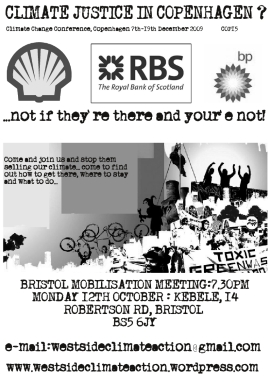
For all those who want climate justice and are pondering going to Copenhagen for the latest in the a long series of ineffective and corrupt inter-governmental talks (COP15) then come to Kebele on Monday October 12th at 7pm. That ‘s 14 Robertson Rd, Bristol BS5 6JY

never ever, ever trust a cop of any description
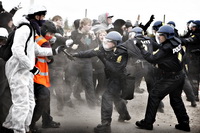
See ?
Co-Mutiny: Next Meeting/COP 15 – Mobilisation
Next C0-Mutiny Meeting– Thursday 6th August 7.30pm. Kebele, 14 Robertson Rd, Easton. BS5 6JY
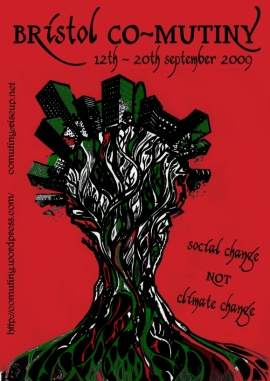
Never trust a cop!
blog address: http://nevertrustacop.wordpress.com/
Climate Change is not an Environmental Disaster it is a Capitalist Disaster
While remaining part of the Climate Justice Action umbrella group, a more radical voice was needed for the mobilisation around the COP15 (Conference of Parties meeting, no. 15) this December in Copenhagen.
The mobilisation will be massive – tens of thousands of people will converg on copehhagen – but will it be more than an ineffective lobbying exercise ? The Choice is yours.
e-mail westsideclimateaction@gmail.com for local mobilisation advice/suggestions.
http://nevertrustacop.wordpress.com/
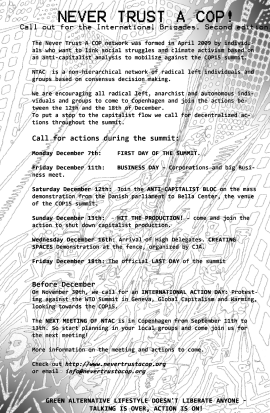
Against COP15 summit, Copenhagen Dec. 2009
The catastrophe is real and climate change is one of its many symptoms.
The COP15’s inevitable talk of “saving the world from the climate
crisis” is an elaborate hoax to disguise the COP15’s true purpose: to
restore the legitimacy of global capitalism by inaugurating an era of
“green” capitalism. A new rhetoric of “saving the climate” will exist to
justify their repression, their fortified borders, their colonial
resource wars. To give the Emperor new clothes. Our response to this
astounding lie is an uncompromising and absolute NO to their system.
More has to be shaken than our holiday habits to sustain the world for
times to come. It would be foolish to pin our hopes upon the very people
who continue to kill off the planet for money. At Copenhagen, they will
argue over how to properly create a market to commodify and so pollute
the biosphere, dispossessing millions of people from their land to
profit from destroying what remains of our earth. Governments and
corporations will not sacrifice their growth to reduce carbon emissions,
or only do so in order to create a new authoritarian regime for themselves.
The entire rhetoric of the “climate crisis” and the “financial crisis”
is a cynical maneouvre by the state spin-doctors to deny the
all-encompassing crisis of self-declared civilization. The COP15 will
only attempt to hide the war that capitalism is waging against all life
on the planet, a war that has spread across the entire globe for the
last five hundred years, a war that encompasses the totality of even the
oceans and atmosphere. In the midst of war, one does not talk of
management and “technical solutions.” You cannot fight a war by
pretending the war does not exist, by blinding yourself to repression
and becoming complicit in accepting the false-promise of a petit
bourgeois tranquility. Instead, one recognizes the enemy. One chooses a
position. One fights.
Only by ridding ourselves of those who claim to be representing us and
by defeating the ideology of endless economic growth, industrial
production and consumption can we take control of our lives and planet.
It is time to state: we are going to consciously attack the structures
supporting the COP15: we will break through the lines of their police;
we will refuse to negotiate with warmongering governments and the
embedded media; we will refuse to side with sell-out NGOs and all the
would-be managers of protest; we will refuse all governments and
governance and not just de-legitimize the present ones. It is time to
state why we think that insurrection is needed to actually begin the
change everybody is so desperate for. Acting together in fundamental
opposition to those in power we might get a first glimpse of the
richness and opportunities possible when ideas, experiences and concepts
are shared amongst people from all over the world.
Against COP15 summit, Copenhagen Dec. 2009
The catastrophe is real and climate change is one of its many symptoms.
The COP15’s inevitable talk of “saving the world from the climate
crisis” is an elaborate hoax to disguise the COP15’s true purpose: to
restore the legitimacy of global capitalism by inaugurating an era of
“green” capitalism. A new rhetoric of “saving the climate” will exist to
justify their repression, their fortified borders, their colonial
resource wars. To give the Emperor new clothes. Our response to this
astounding lie is an uncompromising and absolute NO to their system.
More has to be shaken than our holiday habits to sustain the world for
times to come. It would be foolish to pin our hopes upon the very people
who continue to kill off the planet for money. At Copenhagen, they will
argue over how to properly create a market to commodify and so pollute
the biosphere, dispossessing millions of people from their land to
profit from destroying what remains of our earth. Governments and
corporations will not sacrifice their growth to reduce carbon emissions,
or only do so in order to create a new authoritarian regime for themselves.
The entire rhetoric of the “climate crisis” and the “financial crisis”
is a cynical maneouvre by the state spin-doctors to deny the
all-encompassing crisis of self-declared civilization. The COP15 will
only attempt to hide the war that capitalism is waging against all life
on the planet, a war that has spread across the entire globe for the
last five hundred years, a war that encompasses the totality of even the
oceans and atmosphere. In the midst of war, one does not talk of
management and “technical solutions.” You cannot fight a war by
pretending the war does not exist, by blinding yourself to repression
and becoming complicit in accepting the false-promise of a petit
bourgeois tranquility. Instead, one recognizes the enemy. One chooses a
position. One fights.
Only by ridding ourselves of those who claim to be representing us and
by defeating the ideology of endless economic growth, industrial
production and consumption can we take control of our lives and planet.
It is time to state: we are going to consciously attack the structures
supporting the COP15: we will break through the lines of their police;
we will refuse to negotiate with warmongering governments and the
embedded media; we will refuse to side with sell-out NGOs and all the
would-be managers of protest; we will refuse all governments and
governance and not just de-legitimize the present ones. It is time to
state why we think that insurrection is needed to actually begin the
change everybody is so desperate for. Acting together in fundamental
opposition to those in power we might get a first glimpse of the
richness and opportunities possible when ideas, experiences and concepts
are shared amongst people from all over the world.

